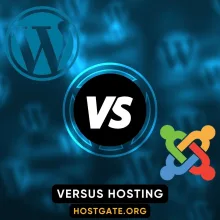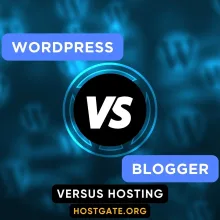WordPress vs Webflow – Which One is Better? | HostingVS
WordPress and Webflow represent two distinct approaches to website development. WordPress, an open-source content management system, offers extensive customization and flexibility through plugins, making it ideal for content-driven and complex websites. Webflow emerges as a design-centric, no-code platform targeting visual creators seeking intuitive website building experiences. While WordPress excels in blogging, content management, and e-commerce with its vast ecosystem, Webflow provides streamlined, visually sophisticated design capabilities without requiring coding skills.
The choice between platforms depends on individual project requirements, technical expertise, design preferences, and budget constraints. WordPress suits those needing comprehensive customization and content management, whereas Webflow appeals to designers and startups prioritizing aesthetic design and simplified website creation. Ultimately, understanding each platform’s strengths and limitations is crucial in making an informed decision.

 Experience the Most Affordable and Reliable Cloud Web Hosting Cloud Web Hosting Starting at Just $3.99/month! - Unlimited Storage & Traffic - Free Domain Included - 24/7 Expert Support - Dedecated & VPS Hosting Plans |
WordPress VS Webflow | WordPress | Webflow |
Development Approach | Open-source, plugin-based, code-intensive | No-code, visual design-focused, SaaS platform |
Design Customization | Requires coding/plugins for advanced design | Drag-and-drop interface with class-based styling, instant visual customization |
Content Management | Robust blogging and editorial features, unlimited users | Limited content management, restricted user roles, design-centric CMS |
Technical Support | Community-driven support, forum-based assistance | Dedicated customer support, AI learning assistant, direct troubleshooting |
Pricing Model | Distributed costs (hosting, plugins, themes) | Transparent tiered pricing, per-seat billing, all-inclusive packages |
WordPress vs Webflow: Choosing the Right Website Platform
In today’s rapidly evolving digital ecosystem, selecting the right website platform can significantly impact your online success. WordPress and Webflow represent two distinctive approaches to web development, each catering to different user needs, technical expertise, and design ambitions.
Platform Origins and Philosophy
WordPress, launched in 2003, originated as a blogging platform and has since transformed into a comprehensive content management system powering over 40% of all websites globally. Its open-source nature and extensive plugin ecosystem have been key to its widespread adoption. Conversely, Webflow emerged as a modern, design-centric SaaS platform targeting creators who prioritize visual design and no-code development experiences.
Technical Setup and Onboarding
WordPress: Complex but Flexible
WordPress installation requires multiple steps: selecting a hosting provider, purchasing a domain, downloading WordPress, and configuring settings. This process demands basic technical understanding and can be intimidating for beginners. Users must independently manage hosting, security, and performance optimization.
Webflow: Streamlined and Intuitive
Webflow offers a dramatically simplified onboarding experience. Its AI-guided tutorial adapts to user’s technical skills, providing personalized setup instructions. The platform handles hosting, security, and performance inherently, eliminating complex configuration requirements.
Design and Customization Capabilities
WordPress: Extensive but Plugin-Dependent
WordPress provides customization through thousands of themes and plugins. However, achieving advanced design requires either coding skills or premium page builder plugins like Elementor. This approach can increase complexity and potential performance overhead.
Webflow: Visual Design Empowerment
Webflow revolutionizes design with its no-code, class-based styling system. Designers can create intricate layouts using drag-and-drop interfaces, with real-time preview and responsive design capabilities. Every design element can be precisely controlled without writing code.
Pricing and Cost Considerations
WordPress: Distributed Expenses
While WordPress itself is free, total costs include:
- Hosting ($3-$30/month)
- Domain registration ($10-$20/annually)
- Themes ($0-$200)
- Plugins ($0-$200)
- Potential developer costs
Webflow: Transparent Pricing Model
Webflow offers clear, tiered pricing:
- Site plans: $14-$39/month
- E-commerce plans: $29-$212/month
- Workspace seats: Additional user costs
Content Management Capabilities
WordPress: Content-Creation Powerhouse
WordPress excels in content management, offering:
- Advanced editorial workflows
- Unlimited user accounts
- Comprehensive blogging tools
- Sophisticated content categorization
Webflow: Design-Focused CMS
Webflow’s content management feels limited compared to WordPress. While functional, it lacks advanced blogging features like comprehensive tagging, comments, and multi-author collaboration.
Marketing and SEO Optimization
WordPress: Plugin-Powered SEO
WordPress offers granular SEO control through plugins like Yoast, providing real-time content optimization recommendations, readability scoring, and keyword analysis.
Webflow: Automated SEO
Webflow provides automated SEO settings with dynamic metadata generation. While convenient, it offers less detailed optimization guidance compared to WordPress plugins.
Ecosystem and Support
WordPress: Community-Driven Support
With 60,000+ plugins and extensive community forums, WordPress offers unparalleled integration possibilities. Support primarily relies on community resources and documentation.
Webflow: Dedicated Customer Service
Webflow provides direct customer support, an emerging app marketplace, and an AI learning assistant, ensuring more immediate problem resolution.
Ideal Use Cases
WordPress Recommended For:
- Blogs and content-driven websites
- E-commerce platforms
- Complex multi-author websites
- Sites requiring extensive customization
Webflow Recommended For:
- Portfolio websites
- Design-centric projects
- Startup landing pages
- Visual-first brand experiences
Potential Limitations
WordPress Drawbacks:
- Steeper learning curve
- Security management complexity
- Performance optimization challenges
- Potential plugin conflicts
Webflow Limitations:
- Limited content management features
- Higher ongoing costs
- Less extensive integration options
- Design customization complexity
Final Recommendation
Choosing between WordPress and Webflow isn’t about finding a universal solution but matching platform capabilities with your specific project requirements. Consider your technical skills, design preferences, budget, and long-term scalability needs.
For content-heavy, highly customizable projects prioritizing flexibility, WordPress remains unbeatable. For design-driven, visually sophisticated websites requiring minimal technical intervention, Webflow offers an elegant, modern solution.
Neither platform is perfect; each shines in different scenarios. Your unique project goals should ultimately guide your decision.
Summary and FAQs
Which platform is better for beginners: WordPress or Webflow?
Webflow is better for beginners. Key reasons include:
Simplified Onboarding
- AI-guided tutorial adapts to user’s technical skills
- Provides personalized setup instructions
- Handles hosting, security, and performance automatically
No-Code Design
- Drag-and-drop interface
- Visual design system
- Real-time preview capabilities
- No coding skills required
Straightforward Setup
- Streamlined platform
- Intuitive interface
- Less technical configuration needed
WordPress, in contrast, requires more technical knowledge:
- Complex installation process
- Requires independent management of hosting and settings
- Advanced design needs coding skills or premium plugins
For users with minimal technical experience seeking an easy website-building experience, Webflow offers a more beginner-friendly approach.
How do the costs compare between WordPress and Webflow?
WordPress Costs:
- Free platform base
- Distributed expenses:
- Hosting: $3-$30/month
- Domain: $10-$20/annually
- Themes: $0-$200
- Plugins: $0-$200
- Potential developer costs
Webflow Costs:
- Direct, tiered pricing:
- Site plans: $14-$39/month
- E-commerce plans: $29-$212/month
- Additional workspace seat costs
WordPress offers more flexibility but requires managing multiple expenses. Webflow provides a more transparent, all-in-one pricing structure with clearer upfront costs.
Which platform is more suitable for e-commerce websites?
WordPress is more suitable for e-commerce websites due to:
Extensive E-commerce Features
- Supports complex e-commerce platforms
- Offers more robust plugin ecosystems for online selling
Flexibility
- Allows advanced customization
- Supports multiple e-commerce integrations
- Provides comprehensive setup options
While Webflow offers e-commerce plans ($29-$212/month), the article suggests its features are less comprehensive compared to WordPress’s mature e-commerce capabilities.
Recommended for WordPress:
- Complex e-commerce platforms
- Websites requiring extensive customization
- Multi-product selling scenarios
Can I migrate my existing website from one platform to another?
You need technical support to migrate from platform to another. It need correct steps to redirect all posts to new platform like 301 redirecting and Google Console management.
To determine migration feasibility, you’d likely need to:
- Assess content complexity
- Check export/import capabilities
- Potentially use specialized migration tools
- Consult each platform’s technical support
Recommendation: Contact Webflow or WordPress web hosting support directly for precise migration guidance specific to your website.
Which platform offers better SEO capabilities?
WordPress offers more robust SEO capabilities:
WordPress SEO Strengths:
- Plugins like Yoast provide advanced features
- Real-time content optimization recommendations
- Readability scoring
- Keyword analysis
- Granular SEO control
Webflow SEO:
- Automated SEO settings
- Dynamic metadata generation
- Less detailed optimization guidance
- More basic compared to WordPress
WordPress provides more comprehensive and customizable SEO tools, making it superior for SEO-focused websites.




